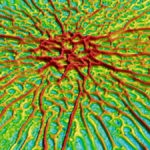Tag Archives Science Notes

Understanding why biofilm is sticky

The challenge of raising beef and dairy in a desert
Science Notes: Irrigation to feed crops for cattle in western U.S. drops river levels

Researchers develop a quick test for DON
Science Notes: Innovation could reduce toxins harmful to both animals and humans

Silky seed coating could distribute plant nutrients
Science Notes: Process could open up new areas of land previously not suitable for agriculture

Researchers unlock key to photosynthesis
Science notes: It is hoped that the finding can mean more productive crop yields

Chicks born with ability to distinguish and avoid dangers
Science Notes: Appropriate reactions to predators key to survival

Protein that triggers plant defences to light stress identified
Science notes: Finding could play role in protecting crops from harsh clime conditions

Seeing greenery linked to less intense and frequent cravings
Science Notes: The research focused on urban areas, but farm families are exposed to greenery every day

Scientists edit chickens resistant to avian flu
Science Notes: New research suggests it could be possible to halt the bird flu virus in chickens

Higher crop yields increase need for Midwest irrigation
Science Notes: As corn crops get bigger with more yield, they will need for more water
